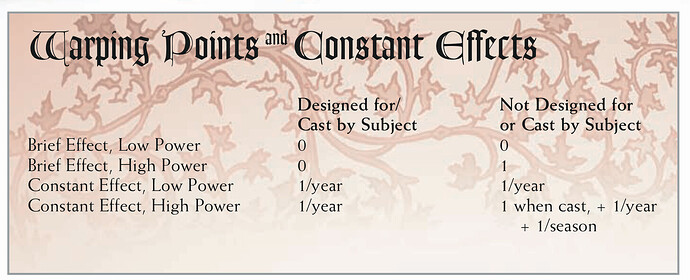While reading through various sourcebooks, I’ve found that many wards against weapons feel incredibly powerful. Take Halt the Piercing Shafts from MoH, for example. A level 25 spell can make a magus entirely immune to ranged weapons for two minutes; make a few adjustments and this spell could easily be cast daily alongside a Magus’ Parma and render all mundane ranged threats pointless.
I considered a few options before settling on an idea that I like. Initially, I considered expanding upon the Muto Corpus guidelines for adding soak (in short, every 5 levels of a spell adds +1 soak for the duration of the spell). The two primary anti-weapon abilities I’ve considered would be Rego Terram and Rego Herbam to repel incoming blows. Because these spells would be specialized, I considered making them comparatively more powerful (so +2 or +3 per 5 levels). Ultimately, this again felt too powerful. With some specialization (and considering Terran’s +2 magnitudes for metal), this could still create long lasting spells fairly cheaply that would suggest a meta of casting Sun spells daily for essentially permanent soak spells. God forbid a Magus combines a MuCo spell and a ReTe spell to end up with large amounts of soak they walk around with constantly… Magi should be squishy!
I ended up with the following idea. I’ve added new general guidelines to both ReHe and ReTe (again, with added magnitudes for metal). Per point of base level, a single “warding point” is added to the magus for the spell’s duration. These warding points are hit before soak is hit and serve as a magical shield that can be overpowered by consistent attacks. If a magus has ten of these warding points and is hit by two matching attacks for 7 and 6 damage accordingly, the first would be negating (leaving 3 points left) and the second would be dampened, allowing only the 3 remaining points of damage to get through.
These wards could be cast with a sun or even moon duration, but are designed to work around diameter durations. That is to say that, anticipating combat, a magus would cast one of these spells to provide him some extra protection at a reasonable cost that doesn’t simply render them invincible to all attacks for two minutes. I’ll drop some examples at the end.
Does this invalidate other warding spells, then, such as ReTe’s level 15 guideline? I don’t think so. Across many discussions on this forum regarding wards, I’ve seen several mentions of wards that must be used against an attack the magus knows about. This makes sense to me, as. I might use Wizard’s Parry (MoH), for example, as a fast cast to entirely block an incoming attack. Likewise, Halt the Piercing Shafts could be used similarly. Therefore, I think these guidelines provide a balanced method of adding soak to ward against attack types without making a magus invincible while still allowing a trained magus to fast cast blocking spells.
House rules can certainly refine these guidelines for each troupe. Maybe only a single type of this warding spell can be used at once. Maybe each base level adds two or only half of a warding point. Maybe these wards pose other issues, such as a magus carrying something made of metal or wood.
Examples:
Ward Against the Blade
ReTe 25
R: Self D: Diameter R: Personal
Provides 10 warding points against incoming attacks made of metal.
(Base 10, +2 to affect metal, +1 diameter)
Ward Against the Bow
ReHe 15
R: Self D: Diameter R Personal
Provides 10 warding points against incoming attacks made of wood.
(Base 20, +1 diameter)
These can be adjusted for longer durations, the ability to affect an ally or allies, etc. My initial idea was that these two are balanced in that the metal spell still affects metal arrowheads, but is more expensive, while the wood spell cheaply blocks arrows or spears mostly made of wood but is useless against axes. You might opt to require a Herbam component for arrows and spears.
I’d love to hear thoughts! I spent a decent chunk of time trying to find a good balance of utility, cost, and power levels while still following the magic system.
